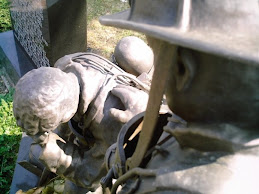 When published in 2003, Anne Applebaum’s Pulitzer Prize-winning Gulag: A History was touted as the most authoritative, comprehensive book on the Soviet labor camps.
When published in 2003, Anne Applebaum’s Pulitzer Prize-winning Gulag: A History was touted as the most authoritative, comprehensive book on the Soviet labor camps.Applebaum, a Washington Post columnist, recounts the many facets of this decades-long slave system. Among her topics are the gulag's origin and expansion, the living conditions and distinctive work at the various camps, and how prisoners survived, rebelled, escaped and died.
While Gulag presents what were, to me, some surprising details, including that numerous prisoners were actually released, Applebaum routinely returns, whether implicitly or explicitly, to the evil purpose of the camps.
One example comes in her comparison of Nazi and Soviet camps. She notes that the Soviet camps focused more on exploiting labor than on deliberately killing "enemies of the people," whereas in Nazi concentration camps, where a Jew's death was virtually assured, the reverse was true. Gulag prisoners usually died not by being deliberately killed, but by the system's "gross inefficiency and neglect,” Applebaum writes. Yet she demonstrates that certain labor camp projects, such as useless grand canals, reflected the communists' desire to kill for killing's sake:
"A propaganda slogan declared that the ‘Danube-Black Sea Canal is the tomb of the Romanian bourgeoisie!' Given that up to 200,000 people may have died building it, that may have indeed been the canal's real purpose."
In the epilogue to her primarily fact-finding, journalist book, Applebaum properly touches on the realities of the post-Soviet population's widespread evasion of this important part of Russia’s history, and points to its harmful consequences, such as Putin's authoritarian rule. Yet, for a book on this subject and its scope, she draws virtually no cause-and-effect relationship between communist ideology and the gulag. Worse, her deeper, conclusive commentary on her subject is actually anti-philosophical:
"Only our ability to debase and destroy and dehumanize our fellow man has been — and will be — repeated again and again”; and: "The more we know of the specific circumstances which led to each episode of mass torture and mass murder, the better we will understand the darker side of our own human nature."
In other words, Applebaum believes not in fundamental philosophic ideas — chief among them being communism’s glorification of self-sacrifice to the state — as the underlying cause of the gulag, but rather man’s “ability,” that is, his (alleged) innate evil, to destroy his fellow man, and certain unspecified “circumstances.”
One of Gulag’s merits, however, is that it offers many concretizations of communism’s inevitable results: mass privations, disease, starvation and death. As I read the various injustices that Soviet citizens suffered under this slave system (within a slave state), I was reminded of accusations that communists and their apologists had leveled against capitalism and the United States. Recall that they claimed that capitalists “exploit” their workers, and asserted that Soviet Russia held the most promise for the “common man,” the promise of unprecedented prosperity and equality of results. All of this came to mind as I read this passage:
"Ivan Nikishov, who became the boss of Dalstroi in 1939, in the wake of the purges, and held the post until 1948, became infamous for accumulating riches in the middle of desperate poverty. [Prison bosses] even began to compete with one another, in a fantastic version of keeping up with the Jonses."
While Applebaum fails to provide a deeper, philosophic understanding of how communism led to the gulag, her book nevertheless provides many examples that help ground the stark reality of that false, evil ideology.
* This is a revision of a previously posted review.































+-+June+2009.jpg)











No comments:
Post a Comment